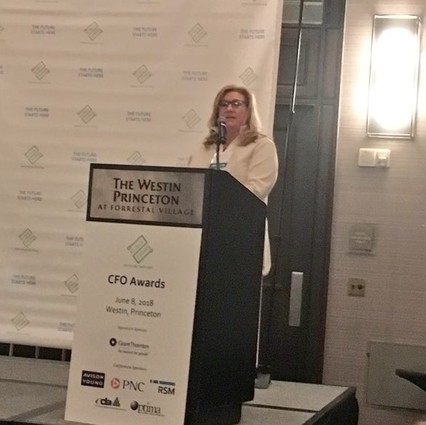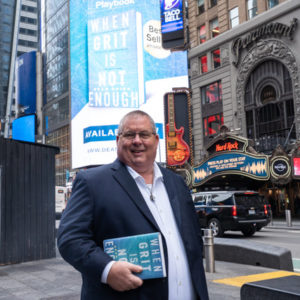Find Workarounds, Be Tenacious and Never Give Up, Monica C. Smith Tells CFOs at NJ Tech Council Event

Monica C. Smith was different. She had a learning disability. She had a tough time in school.
Yet today she is the founder and CEO of Marketsmith (Cedar Knolls), a growing, thriving, woman-owned, tech-based marketing and advertising company. Marketsmith offers patented solutions to companies in need of marketing data, visualization, business intelligence and media optimization.
Speaking at the New Jersey Tech Council’s 2018 CFO Awards event, Smith noted that the bedrock of her success in marketing and advertising had been the evolution, adaptation and focused application of financial data in her products and services.
She said that she had spent the greater part of the last few years trying to show advertisers and marketers how to properly use financial data and other data to monitor ad purchasing decisions in real time. “We use financial models to write marketing stories to create the profitable brands that we love.”
As the only girl in a family of seven children, Smith said, “I knew there were differences between men and women … but it just didn’t define us.” Her mother guided her, telling her to play baseball and softball because “there were no scholarships for cheerleading.”
Not all of the teams were good, so she learned how to be tough, play hard and push herself. “I never went to a great school, I never played on a great team, and I never had great grades.”
Smith said that she had a learning disability that significantly impeded her ability to retain information. It was so bad that her English professor during her freshman year at college, after seeing her first paper, asked if she spoke English at home.
“I learned how to succeed by first learning how to survive. … I learned early on that giving up was never an option. Finding solutions, pathways, and getting to higher ground” became an innate characteristic.
A key takeaway for CFOs, Smith said, is that “just because a struggle exists … it doesn’t mean you throw in the towel. You look for workarounds, never give up, be tenacious. Not everyone learns in the exact same way. Leadership-agility and life-agility skills are absolutely priceless. “
Creativity and compassion are as important as financial-management skills in business, she told the group. Allowing people to be their whole selves enables them to innovate, be creative and engaged and to reach out beyond their core competencies, she said. “It also brings teams together.”
The freedom to be yourself also means the freedom to learn, fail, ideate for a cause and to participate in the betterment of something greater than you, she said. When companies encourage people to be themselves, they encourage engagement and participation without judgement. Employees “are willing to fully give during their work day.”
Smith describes herself as a “rule breaker,” but most of the time she simply worked around the rules that didn’t make sense.
For example, at college she wanted to major in advertising, which was all about ideas, creativity and business. But the program required an internship in New York City, which she didn’t want to do. “So, I convinced the administration of the need for an athletic communications department, and in doing so I created my own internship for sports marketing.”
Although the internship was going well, she wasn’t satisfied, so she relaunched the defunct school newspaper, “and had athletes writing their own stories. It was very controversial, poorly written, but it was new and it was fresh.” It also became the rage on campus. “When I graduated, I received a reward from the college: a $500 gift for relaunching the paper and making it self-funded because I sold advertising. They didn’t tell me that the school paid for print!
“That entire experience taught me that the benefits of finding a different pathway and thinking beyond the rules was super worth it.”
Another takeaway, Smith said, was that the road to success “is definitely not a straight line, it’s full of curves, but opportunities lie along the way, so keep your eyes open and always be ready.”
Smith said that she had found opportunities in the companies she worked for, and that at each company she found an advocate who would let her do things her way. She was making a lot of money and moving up the ladder, but she always heard threats that she’d be fired for ignoring the rules, and she was eventually fired.
When she started Marketsmith in 1999, she noticed a hole in the market: Manufacturers weren’t capturing readily available marketing data that could help them define a path forward. And this was at a time when a shift was happening in the market that required them to convert from a manufacturing model to a branded model, in which the consumer had to reach them directly.
Marketsmith’s approach was to solve the problem by building out direct-to-consumer business models for retail products and for nonprofits. The company attracted big brand names, including Amazon. Smith said that Marketsmith remains the only “martech advertising agency of its kind.” It’s also one of the largest women-owned agencies in the country. But it was a slow build.
The company has created a number of data sets as linked data warehouses for integrating marketing information and algorithms to help companies predict and manage their growth. “In 2009 I realized that the logic we were using to house and apply to direct mail advertising could also be applied to long-form media and infomercials. I convinced a client to let us test the idea.” That client was SharkNinja (Needham, Mass.), and it has grown from $250 million to $1.8 billion in annual sales using this methodology, she said.
Because the data base was so big, Marketsmith needed multiple analysts on its team, leading Smith to create i.Predictus (Cedar Knolls). “The jump in staffing affected the payroll in a way that was untenable,” Smith said, so she had to find a way to automate the analysis. She started i.Predictus, spun it off from Marketsmith and raised millions in seed money. She also did a Series A round for the startup. However, her vision is to merge all her brands together and create one superior martech agency. “When I saw the software-as-a-service market was stalling, I approached investors to buy them out with interest. … Not all investors wanted to be bought out,” but Marketsmith became the sole owner of i.Predictus in 2016.
Near the end of her talk, Smith provided some lessons that she had learned along her journey. When she first started Marketsmith, she relied on more experienced people to execute her vision. She also outsourced her technology build. Both moves were terribly wrong, she said.
“Founders need to be present. They need to track their progress until the product or model gets daylighted, so stepping away during that time was a huge mistake.” She also learned that having the right talent onboard is paramount. “Pressure-testing talent is mission-critical before they sign on.” Finding the right technical experts has always been crucial, she said, but now it is critical.

